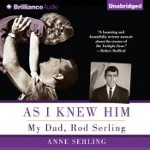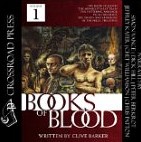|
Phil Jackson served as head coach
for the Chicago Bulls and the Los Angeles Lakers,
and won more championships than any coach in the history
of professional sports. Unlike some other coaches
whose scandals regularly make the news, he was an
inspiration to his players and not a "screaming
me-me." His new biography (Eleven
Rings) is a fascinating journey from
his days as a preacher's kid in North Dakota to how
he managed Michael Jordan and others like Dennis Rodman
(who was deemed "uncoachable") using Zen
techniques.Written with Hugh Delehanty, this revelatory
audiobook is read by Matt Walton,
who maintains a consistent upbeat tone with a voice
that never bores. (And I get bored with sports easily,
as author of The Umpire Has No Clothes.) |
|
 |
AS
I KNEW HIM by Anne Serling is
an honest, revelatory, and fascinating memoir of one
of television's most original and provocative writers,
Rod Serling, told by his daughter in loving memory.
Serling also reads her book on audio,
and paints a portrait that is anything but dark. Recalling
a personal life with her father, she reveals a complex
man with a silly sense of humor, deep political convictions,
and boundless imagination. Not only does she comment
on most of his works, but she reads letters from her
father, and shares his reactions, opinions, and complaints
about the machine that is Hollywood. Who is this enigma
of a man with a cigarette? You will know after hearing
this book. Serling won multiple Emmys during his career,
but more than that he was unafraid to unmask the prejudices
and flaws of those more interested in perpetuating
the status quo. Some of his scripts were tongue-in-cheek
simplistic, but others were masterpieces, such as
"Requiem for a Heavyweight" and the ending
to the movie "Planet of the Apes" (for which
he was credited.) Much of what he wrote has relevance
for today, such as this quote: "Poverty, hunger,
racial tension, pollution are here and now. These
are the things that scream for a response. And if
we don't listen to that scream…and if we don't
respond to it, we may well end up sitting amidst our
own rubble, looking for the truck that hit us, or
the bomb that pulverized us. Get the license number
of whatever it was that destroyed the dream, and I
think we will find that the vehicle is registered
in our own name." My interview with Anne is here:
TowerReview.com/Anne-Serling.html. |
|
 |
Clive Barker, the evil genius behind
movies such as Candyman, Nightbreed
and Hellraiser (which was based on his novella
The Hellbound Heart), and novels such as
Abarat and Imajica, has had the first volume of his
debut horror story collection BOOKS
OF BLOOD released on audio for the first
time. Narrators include Chris Patton, Jeffrey
Kafer, Dick Hill, Peter Berkrot, Simon Vance, and
Chet Williamson. The narration is stellar,
and the mix eclectic both in tone and range. After
the original introduction by Ramsey Campbell and a
new intro by David Niall Wilson, the frame story is
presented (a useful device; I once did this for the
CD "Oscar's Hijack.") Then come stories
like "The Midnight Meat Train" (set in the
NY subway system, this grisly story was made into
a movie starring Bradley Cooper.) "The Yattering
and Jack" is a funny demon story given the kind
of twists only Hill can convey. If Dick were on The
Voice, Blake and Adam would be talking about his wicked
nuances of character construction. (Actually, there
should be a show for storytellers called "Story
Star." It would certainly be more interesting
than singing worn out pop songs.) Other stories are"Pig
Blood Blues" (a missing boy ghost story,)"Sex,
Death, and Starshine" (a satirical zombie story
set in a theater), and finally "In the Hills,
the Cities," a Lovecraft-like story, with all
the power and command of language which that author
conveys, (and it's also one of the most unusual horror
stories you'll ever hear.) |
|
|
DETROIT
- An American Autopsy by Charlie LeDuff chronicles
the state of Motown after the roller-coaster ride
of carmakers like GM and Ford. Written with dark wit
and confessional bravery, the book outlines corruption
with case studies of politics and law enforcement
gone wrong. Is Detroit a microcosm of America? Maybe
or maybe not, but you decide, after hearing astonishing
instances in which failures of management are augmented
by apathy. As read with a subdued, ironic
chagrin by Eric Martin, this is a cautionary
true tale told by a former Pulitzer Prize winning
journalist for the NY Times, now working for Fox News
in Detroit (and what a delicious irony that is for
a writer, considering that South Korea now has the
largest auto plant in the world, while the Big Three
in America have abandoned Detroit to work out of city
or out of state.)
|
|
|
GUN MACHINE by former graphics novelist
Warren Ellis is a pulp police thriller
with the gritty feel of the movie Sin City. In this
case the city is New York, specifically Manhattan, with
the added dimension of what the author refers to as
"ghost maps," a kind of I.T. shorthand for
the informational grid that secretly forms boundaries
between jurisdictions, related in part to camera surveillance
and to computer response time (as well as historical
relevance.) Amid the highly charged debate going on
in Washington involving gun violence, the story has
been released on audio with a plot involving a detective
named John Tallow who stumbles upon an apartment containing
a mountain of weapons, each one involved in a different
unsolved murder. That this should be in New York, where
carrying guns is banned, adds to the novel's intensity.
Now there's a killer he's trading wits with called "the
hunter," a man-devil whose presence has aided powerful
Wall Street despots, and who has secret motives of his
own. Reg E. Cathey is the ideal narrator
for the story, with his harsh nicotine voice and ability
to charge the characters with believable voices. For
at least the first half, it's more of an acting performance
than a reading. By the end he's back to what might be
typical of a more prolific reader, presumably because
you've got the picture by then. If you like James Patterson,
with his characteristic short sentences and punchy dialogue,
you'll love Gun Machine. Not everything
is totally believable about the story, including the
ultimate motive of the hunter, but you'll be willing
to suspend disbelief for the duration. It's not literature
(for that you have James Lee Burke), but if you're looking
for weird, zany, gutsy (and don't cringe at the F word),
it is an original twist on the overworked serial killer
theme.
|
|